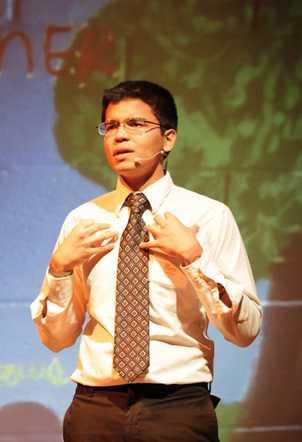Arthur J Pais
In the fourth part of the series on Indian Americans who won Paul and Daisy Soros Fellowships, Arthur J Pais profiles Vineet Singal, who is doing his to make this world a healthier place.
Part 1: Diabetes, divorce, displacement: He still won a Fellowship
Part 2: Waking up everybody, from Palestine to America
Part 3: 'I am a proud Sikh, proud American'
For young Vineet Singal, who was 10 when his physician parents found a job in Saudi Arabia, adjusting to a multiethnic and multinational community around him was easy. A couple of years later, when his family moved to a small New Zealand town, everything seemed bleak and frightening.
"I was 13 and for the first time in my life I experienced intense racism and bullying," the Mayo Clinic-bound Stanford graduate recalled. "A group of boys constantly made fun of me for being a foreign kid with an accent, wearing glasses, and being overweight. I was, for some time, afraid even to discuss this. There was physical abuse, beatings; on many occasions during lunchtime I hid in the school corridors."
About a year later, his parents found jobs in New York and in the multiethnic and international culture around him, he began to build his self-esteem. The young man who had found it difficult to speak in the class in New Zealand emerged as a budding debater and conducting epidemiological research at a hospital on hepatitis C. He was high school valedictorian, and was accepted into Stanford.
"There were still many challenges," he said. "At 18, my doctor told me that I was pre-diabetic, and if I didn't change my habits, I'd be diabetic within two years."
He asked his parents to give him a bicycle, which he rode for two hours a day. He also followed a strict all-natural, low-carb, high protein and vegetable diet. He lost 75 pounds in less than two years.
'The key was making the change in my mindset from just wanting to lose weight, to really loving being fit,' he told The Huffington Post. Though he travels quite a bit and is involved in life-transforming non-governmental organisation work which has been profiled in publications including Forbes, he said, 'Now I never miss a workout, and I'm always building my knowledge about nutrition.'
Another turning point in his young life was when Hurricane Ike hit his home state of Texas. He decided to take a quarter off from Stanford and work at a free clinic in Galveston, Texas, where 50 per cent of the population was uninsured.
"I wanted to be somewhere I could make a difference and in the process learn a few things and find out if I should go into medicine," he said. He was responsible for taking medical histories, but within days moved into doing routine physical exams, and even recommending treatments because the clinic was so understaffed.
"There was also some education about hypertension and diabetes, and I realised the importance of giving out this kind of information," he said.
He said he recommended cheap nutritional foods, and started exercise programmes that didn't need going to a gym. Back at Stanford, he founded the non-profit Anjna Patient Education, naming it after his mother, that uses text messaging and tablet computers to offer education at free health clinics. From five volunteers, Anjna has more than 250 now at Stanford and other campuses.
Over a year ago, it helped Stanford Business School Professor Jennifer Aaker's 100,000 Cheeks Campaign to rally South Asians to register as bone marrow donors.
"We have exceeded our target and we could now think of a one million cheeks campaign," Singal said.
In March he was awarded the American Immigration Council's Immigrant Youth Achievement Award.
He told The Huffington Post: 'It's not just about winning awards or speaking at TEDx conferences, but doing what I love and serving others. If I didn't feel I was making a difference in the world, I wouldn't be doing it.'


Comment
article